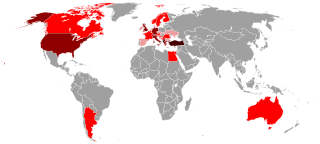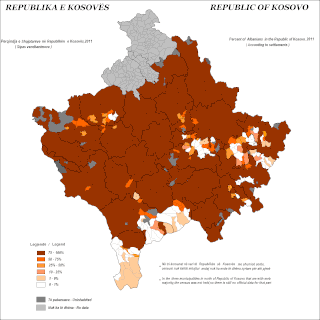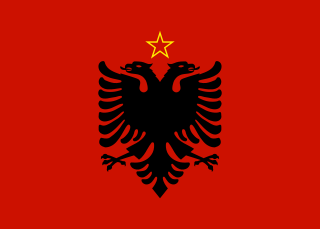Related Research Articles

Albania, officially the Republic of Albania, is a country in Southeastern Europe. It is located on the Adriatic and Ionian Seas within the Mediterranean Sea and shares land borders with Montenegro to the northwest, Kosovo to the northeast, North Macedonia to the east and Greece to the south. Tirana is its capital and largest city, followed by Durrës, Vlorë, and Shkodër.

The Albanians are an ethnic group and nation native to the Balkan Peninsula who share a common Albanian ancestry, culture, history and language. They primarily live in Albania, Kosovo, North Macedonia, Montenegro, Serbia as well as in Croatia, Greece, Italy and Turkey. They also constitute a large diaspora with several communities established across Europe, the Americas and Oceania.

Enver Halil Hoxha was an Albanian communist politician who was the authoritarian ruler of Albania from 1944 until his death in 1985. He was First Secretary of the Party of Labour of Albania from 1941 until his death in 1985. He was also a member of the Politburo of the Party of Labour of Albania, chairman of the Democratic Front of Albania, and commander-in-chief of the armed forces and ruled the country from 1944 until his death in 1985. He was the 22nd Prime Minister of Albania from 1944 to 1954 and at various times was both foreign minister and defence minister of the People's Socialist Republic of Albania.
The history of Albania forms a part of the history of Europe. During classical antiquity, Albania was home to several Illyrian tribes such as the Ardiaei, Albanoi, Amantini, Enchele, Taulantii and many others, but also Thracian and Greek tribes, as well as several Greek colonies established on the Illyrian coast. In the 3rd century BC, the area was annexed by Rome and became part of the Roman provinces of Dalmatia, Macedonia and Moesia Superior. Afterwards, the territory remained under Roman and Byzantine control until the Slavic migrations of the 7th century. It was integrated into the Bulgarian Empire in the 9th century.

The Kosovo War was an armed conflict in Kosovo that started 28 February 1998 and lasted until 11 June 1999. It was fought by the forces of the Federal Republic of Yugoslavia, which controlled Kosovo before the war, and the Kosovo Albanian rebel group known as the Kosovo Liberation Army (KLA). The conflict ended when the North Atlantic Treaty Organization (NATO) intervened by beginning air strikes in March 1999 which resulted in Yugoslav forces withdrawing from Kosovo.

Kosovo, officially the Republic of Kosovo, is a partially recognised state in Southeast Europe. It lies at the centre of the Balkans. Kosovo unilaterally declared its independence from Serbia on 17 February 2008, and has since gained diplomatic recognition as a sovereign state by 101 member states of the United Nations. It is bordered by Serbia to the north and east, North Macedonia to the southeast, Albania to the southwest, and Montenegro to the west. Most of central Kosovo is dominated by the vast plains and fields of Dukagjini and Kosovo field. The Accursed Mountains and Šar Mountains rise in the southwest and southeast, respectively. Its capital and largest city is Pristina.

Tirana is the capital and largest city of Albania. It is located in the centre of the country, enclosed by mountains and hills with Dajti rising to the east and a slight valley to the northwest overlooking the Adriatic Sea in the distance. Due to its location at the Plain of Tirana and the close proximity to the Mediterranean Sea, the city is particularly influenced by a Mediterranean seasonal climate. It is among the wettest and sunniest cities in Europe, with 2,544 hours of sun per year.

The Albanian Armed Forces are the military of Albania and were formed after the declaration of independence in 1912. Today, it consists of the General Staff, the Albanian Land Force, Albanian Air Force and the Albanian Naval Force.

The Albania national football team represents Albania in men's international football, and is governed by the Albanian Football Association, the governing body for football in Albania.

The Albanian Football Association is the governing body of football in Albania. The association is based in Tirana, Albania. It organises the national football leagues of the Albanian Superliga, the First Division, the Second Division, the Third Division, the Albanian Cup and Supercup. Albania women's national football team, Albanian women's football championship, and the Albanian Women's Cup are also overseen. The association also coordinates the activities of the Albania national football team and the Albania national youth football teams such as Under-21, Under-20, Under-19, Under-18, Under-17, Under-16 and Under-15.
The most common religion in Albania is Islam, with the second-most-common religion being Christianity. There are also many irreligious Albanians. There are no official statistics regarding the number of practising religious people per each religious group.

The Parliament of Albania or Kuvendi is the unicameral representative body of the citizens of the Republic of Albania; it is Albania's legislature. The Parliament is composed of no less than 140 members elected to a four-year term on the basis of direct, universal, periodic and equal suffrage by secret ballot. The Parliament is presided over by the Speaker, who is assisted by at least one deputy speaker. The electoral system is based on party-list proportional representation. There are 12 multi-seat constituencies, corresponding to the country's counties.

The Albanians of Kosovo, also commonly called Kosovo Albanians, Kosovar/Kosovan Albanians or Kosovars/Kosovans, constitute the largest ethnic group in Kosovo.
Albanian mafia or Albanian organized crime are the general terms used for criminal organizations based in Albania or composed of ethnic Albanians. Albanian organized crime is active in Europe, North America, South America, and various other parts of the world including the Middle East and Asia. The Albanian Mafia participates in a diverse range of criminal enterprises including trafficking in drugs, arms, and humans. They are said to control a large part of the billion dollar wholesale cocaine market in Europe and appear to be the primary distributors of cocaine in various European drug hubs including London. Albanian organized crime is characterized by diversified criminal enterprises which, in their complexity, demonstrate a very high criminal capacity. In Albania, there are over 15 mafia families that control organized crime.

Albanian folk beliefs comprise the beliefs expressed in the customs, rituals, myths, legends and tales of the Albanian people. The elements of Albanian mythology are of Paleo-Balkanic origin and almost all of them are pagan. Albanian folklore evolved over the centuries in a relatively isolated tribal culture and society. Albanian folk tales and legends have been orally transmitted down the generations and are still very much alive in the mountainous regions of Albania, Kosovo, western North Macedonia, lands formerly inhabited by Albanians like Montenegro and southern Serbia, and among the Arbëreshë in Italy and the Arvanites in Greece.

The People's Socialist Republic of Albania was the Marxist–Leninist one party state that existed in Albania from 1946 to 1991 (the official name of the country was the People's Republic of Albania from 1946 until 1976. From 1944 to 1946, the state of Albania was known as the Democratic Government of Albania.

The Italian protectorate of Albania, also known as the Kingdom of Albania or Greater Albania, existed as a protectorate of the Kingdom of Italy. It was practically a union between Italy and Albania, officially led by Italy's King Victor Emmanuel III and its government: Albania was led by Italian governors, after being militarily occupied by Italy, from 1939 until 1943. During this time, Albania ceased to exist as an independent country and became an autonomous part of the Italian Empire. Officials intended to make Albania part of a Greater Italy by assimilating Albanians as Italians and colonizing Albania with Italian settlers from the Italian Peninsula to transform it gradually into an Italian land.

Pristina is the capital and largest city of Kosovo. The city's municipal boundaries in Pristina District form the largest urban center in Kosovo. After Tirana, Pristina has the second largest population of ethnic Albanians and speakers of the Albanian language.

Albanian is an Indo-European language and an independent branch of that family of languages. It is spoken by the Albanians in the Balkans and by the Albanian diaspora, which is generally concentrated in the Americas, Europe and Oceania. With perhaps as many as 7.5 million speakers, it comprises an independent branch within the Indo-European languages and is not closely related to any other modern language.

The Catholic Church has a population in Kosovo of approximately 65,000 in a region of roughly 2 million people. Another 60,000 Kosovan Catholics are outside the region, mainly for work. They are mainly ethnic Albanians, with a few Croats.
References
- ↑ "Albanian court decision under fire". SETimes.com. 2010-06-25. Retrieved 2013-08-19.